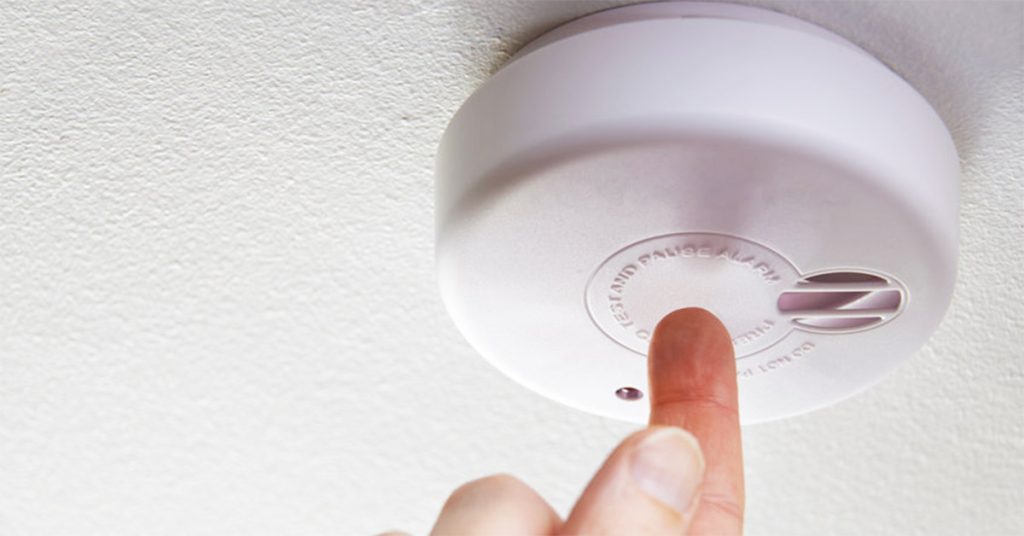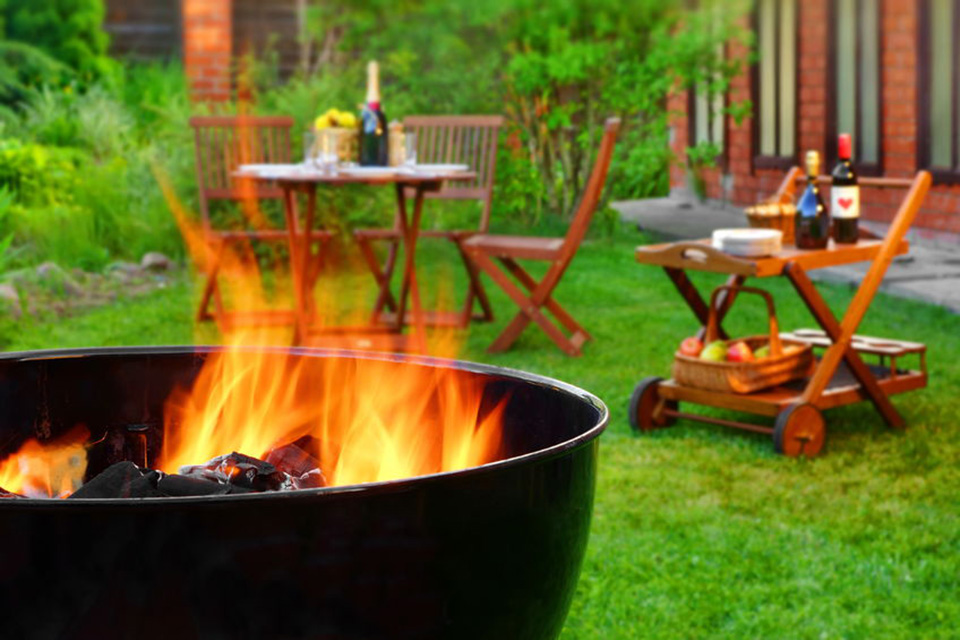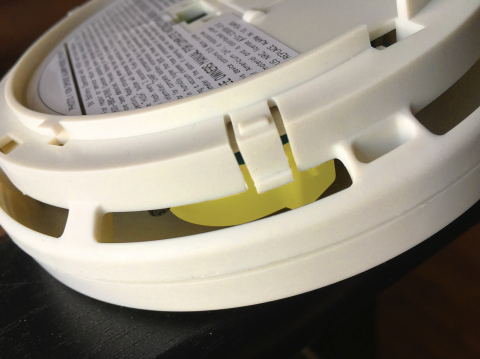Fire Safety
Take a Simple Step for Safety: Test Your Smoke Alarms When You Set Your Clocks Back This Weekend
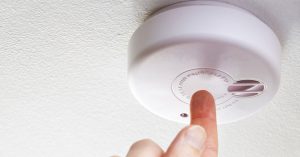
Protect your family and home. Test your smoke alarms when you set the clocks back for Daylight Saving Time on Nov. 7.
Stay vigilant about smoke alarms and protect your family this winter. This coming Sunday – November 7th – Daylight Saving Time ends. As you set your clocks back, we encourage you to also test your smoke alarms and carbon monoxide detectors.
It is critical that your smoke alarms work as we approach winter, when we spend more time indoors, cook for the holidays and there is a greater risk for home fires and fire injuries.
Half of All Massachusetts Fire Deaths Occur in Homes Without Working Smoke Alarms
In 2020, half of all Massachusetts fire deaths occurred in homes without working smoke alarms, the state fire marshal’s office announced earlier this year. This was based on preliminary data.
End-of-year data showed there were 29,641 fires across Massachusetts in 2020, a 16 percent increase over 2019. The number of civilian deaths rose from 39 in preliminary data to 44, up from 42 in 2019. There were 245 civilian injuries and 594 fire service injuries in 2020. Smoking was the leading cause of residential fire deaths in Massachusetts, followed by electrical and cooking fires.
The traditional reminder has been to replace your home’s smoke alarm batteries twice a year – at the start and end of Daylight Saving Time. You should still do so if your smoke alarms operate on regular batteries.
But in 2016, the state of Massachusetts updated the fire safety requirements, steering more homeowners toward newer smoke alarms designed to last 10 years without a battery change. So not everyone needs to change their smoke alarm batteries.
Testing is still essential. If a fire breaks out, you may have seconds to escape and your smoke alarm has to work for you, your family, loved ones and roommates. Commit to test your smoke alarms and carbon monoxide detectors monthly and twice a year when you change the clocks for Daylight Saving Time. This is a simple step – just press the test button.
Read Your Product Manual and Learn the Sounds of Your Smoke Alarm
Read your smoke alarm product manual. Make sure you recognize how the alarm sounds – when it chirps to alert you of failing batteries and in an actual emergency. If you do not know, search for the product information online or call the manufacturer. The Massachusetts State Fire Marshal’s office also shared safety tips as part of Fire Prevention Week earlier this month. The theme was “Learn the Sounds of Fire Safety,” the sound of your smoke alarms.
Involve other family members in this, especially older adults. Those 65 and older are highly vulnerable when fires break out, accounting for more than 40 percent of all fire deaths in Massachusetts during 2020, according to the state fire marshal’s office. Older adults may seem healthy, but they may suffer from a medical condition they haven’t shared or side effects to medication. Another potential barrier is untreated hearing loss.
One in three people between age 65 and 74 suffer from hearing loss, according to the National Institute on Aging. When they get older, nearly half of all adults age 75 and older have difficulty hearing. Step in and help older adults. Offer to take them to their primary care doctor and learn about smoke alarms for those who are deaf or have difficulty hearing.
Check for Smoke Alarm Recalls
Unfortunately, like other products, there are times when smoke alarms are recalled due to defect. In May 2020, the Consumer Product Safety Commission announced the recall of more than 220,000 Kidde TrueSense Smoke Alarms and Combination Smoke/Carbon Monoxide Alarms. These alarms were newer models, sold between May 2019 and September 2020.
When you test the batteries at Daylight Saving Time, you can check the Consumer Product Safety Commission (CPSC) website for smoke alarm recalls. Take time for this, even if you have registered your smoke alarm with the manufacturer. While you are there, check for product recalls involving unsafe winter heating products, including electric blankets, space heaters, children’s pajamas and other products. This is an easy but important step for safety. If you own any of these products, take the recall seriously. Remove the defective product from your home now so no one reaches for it on a cold night.
One Survey: Many Americans Are Not Testing Smoke Alarm Batteries
While this is a simple step, not everyone is testing smoke alarms. Earlier this year, a Consumer Reports survey found roughly one-third of all Americans could not recall when they last tested their home’s smoke alarm. About 25 percent could not recall replacing their smoke alarm batteries, while more than half could not remember when they had installed the devices. But this doesn’t have to be the case. You can easily test your smoke alarm and pull out the product materials right now.
About Breakstone, White & Gluck – Boston Personal Injury Lawyers
At Breakstone, White & Gluck, our Boston personal injury lawyers have over 100 years combined experience representing those injured in premises liability accidents, construction accidents, structure fires and fires caused by landlord neglect. Our attorneys have represented clients, including college students, tenants and their families after serious injuries and wrongful death in fires.
If you or a loved one have been injured or killed in a fire, learn your legal rights. Contact our attorneys at Breakstone, White & Gluck at 800-379-1244 or 617-723-7676 or use our contact form.
Grilling Safety at Summer Picnics and BBQs in Massachusetts
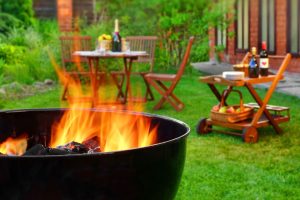
The first rule of grill safety: never leave your BBQ unattended.
As we approach the Fourth of July, many of us have grilling on our minds, and all the delights of summer BBQs. If you plan to grill, we hope you enjoy, but please remember to follow the rules of safety at all times.
This is the time to plan, because as we enjoy friends and family, July is the peak month for grill fires, the weeks when nearly 20 percent of all grill fires across the U.S. happen, according to the National Fire Protection Association (NFPA). August is another high risk month, accounting for 12 percent of grill fires.
Though these fires are devastating and life-changing events, they don’t always make the news. But according to the Massachusetts State Fire Marshal’s office, there were 474 fires involving grills, hibachis and barbecues between 2014 and 2018. Nineteen civilians were injured and seven firefighters were hurt in the wreckage. Property damage totaled $3.8 million in losses.
Across the 50 states, firefighters responded to 10,200 home fires involving grills, hibachis and barbecues each year from 2013 to 2017. Ten civilians were killed and 160 were injured. Property damage resulted in $123 million in losses.
Grilling Safety Tips
Compiled From the Massachusetts State Fire Marshal’s Office and Other Sources
- Only use propane and charcoal grills outdoors.
- Never leave your grill unattended.
- Keep a fire extinguisher nearby.
- Grills should be set up at least 10 feet away from the house or deck railings.
- Gas grills can be used on first-floor decks and patios, but they must be located on the ground level or have an outdoor stairway leading to the ground.
- Grills should never be set up under a roof overhang or low-hanging tree branches.
- Grills should not be used on fire escapes.
- Take additional precautions around children. Keep matches and lighters out of their reach. Create a circle of safety, keeping children and pets at least three feet away (more space is better).
- Do your grilling at least three feet away from tables and furniture. Fold grill covers and remove them from the cooking area.
Safe Handling of Propane Tanks
- Never smoke while handling or cooking with a propane cylinder.
- Keep propane tanks outdoors at all times, at least 10 feet distance from doors and other building openings. This includes windows and dryer vents.
- Keep propane tanks at least 20 feet from air intake vents and ignition sources.
- Propane cylinders should be stored outdoors in shady areas. Cylinders should not be used or kept in high temperatures.
- Replace propane cylinders that are aging, rusting or showing other wear and tear.
Charcoal Grills
- As with other grills, only use charcoal grills outdoors.
- When using charcoal grills, only use charcoal starter fluid. Never use gasoline or kerosene.
- Never add lighter fluid to hot coals. This can cause a flash fire, causing serious skin burns.
- Use charcoal grills in open outdoor decks and patios, just as you would gas grills. Be aware that charcoal briquettes emit carbon monoxide, a clear, odor-free gas which can accumulate in spaces and be deadly. Charcoal grills should never be placed in close quarters near an open window.
- Allow the grill to cool. After 48 hours pass, you can safely dispose of coals.
- If you cannot wait 48 hours, soak the coals in water, then place them in a metal container.
Maintaining Grills
- Review the product manual and instructions that come with your grill.
- Start by opening your grill to see if there is any animal activity or unexpected conditions.
- Next, check that your propane tank is safe for use. Dab soapy water on your propane tank and turn it on for a moment. If there is bubbling, you may have a potential leak. This should be done carefully. Before you try, watch a National Fire Protection Association video.
- Check that connections are tight before you turn the gas on.
- Clean the grease trap every time you grill.
Rooftop Grilling
Rooftop grilling is against the law in Massachusetts. When someone tries to grill on a rooftop, the damage can be deadly and exponential. Some may still remember the 2010 gas grill fire explosion that exploded and lit up the sky over Charlestown. Starting the fire was an illegal propane tank which exploded on a residential building’s rooftop. Soon after, three other illegal gas tanks burst nearby, igniting a 4-alarm blaze which move through several buildings.
Firefighters – 125 in all – battled the fire on a 100-degree Boston day. Nine firefighters and two civilians were treated for heat exhaustion injuries.
Maintain Safe Decks and Porches
Grill fires can happen when someone makes a mistake while cooking, when a child gets too close to the grill or if the grill has a product defect. Landlords may be held responsible in certain grill fires if they keep a defective grill or fail to meet building codes and illegally close off access ways. In Massachusetts, most residential properties are also required to have working smoke alarms on each floor of floor, including inside bedrooms and other areas. They must also have working carbon monoxide detectors.
You cannot always prevent negligence in these situations. But you may be able to minimize many injuries by providing yourself a little more room to work and taking it slow. Keep the grill area and walkways leading there open and clear. When you take grill covers off, set them in safe areas away from the grill. Finally, tell everyone in your home you are grilling and ask another adult to watch children.
Sources for this blog include:
Grilling Safety, Mass.gov
Getting Fired Up for Grilling Safety, Massachusetts State Fire Marshal’s Office
National Fire Protection Association
About Breakstone, White & Gluck
Breakstone, White & Gluck is a Boston personal injury law firm with expertise in premises liability and product liability cases. With more than 100 years combined experience, our attorneys have been recognized as top-rated personal injury lawyers in Massachusetts. Through our Project KidSafe campaign, we also work to bring safety information to individuals and families to help them make safe choices.
If you have been seriously injured by the negligence of someone else, learn your legal rights for seeking compensation. For a free legal consultation, contact us at 800-379-1244 or 617-723-7676 or use our contact form.
After Kidde Recall, Consumers Are Urged to Check Smoke Alarms
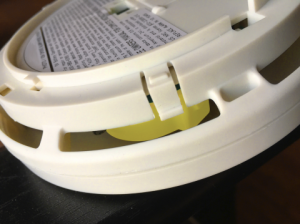
Kidde recalled nearly a half million smoke alarms which may have a dangerous yellow cap left inside. (Recall date: March 21, 2018; Photo: CPSC website)
Please check your smoke alarms when you get home. Kidde has recalled nearly half a million smoke alarms, urging consumers to check devices for yellow caps potentially left on during the manufacturing process. According to the company’s recall notice, the cap would be on one of two sensors inside the smoke detector, compromising the device. Consumers have to do this inspection carefully. You will be looking for the yellow cap through the opening on the side of the device, as shown in the photo. Be careful not to open the smoke alarm or take it apart.
Because Kidde is one of the largest manufacturers, every consumer should check their smoke alarm. If you have a Kidde device, you will need to take it off the wall or ceiling to check the date code on the back. The recalled smoke alarms were dated September 10, 2016 through October 13, 2017. They were sold through January 2018 at Home Depot, Walmart and other retailers. They were manufactured in China, by Fyrnetics Limited, of Hong Kong.
Recall Numbers:
PI9010 (DC/battery powered)
Date codes: Sept. 10, 2016 through Oct. 13, 2017
PI2010 (AC/hardwired)
Date codes: Sept. 10, 2016 through Oct. 13, 2017
Steps for Inspecting Your Smoke Alarm
The Consumer Product Safety Commission recall notice warns consumers not to open the device. Take it off the ceiling or wall, then inspect the alarm through the opening on the side of the device. If you see a yellow cap, you should immediately contact Kidde toll-free at 833-551-7739 for a free replacement. We encourage you to read the recall notice for hours of operation and other information.
Kidde issued the product recall after the yellow cap was found on a smoke alarm which was about to be installed in a consumer’s home. No injuries or incidents reported. Kidde recalled 452,000 smoke alarms sold in the United States and about 40,000 in Canada.
Importance of Smoke Alarms
Smoke alarms are fundamental to safety. Massachusetts has strict laws requiring installation in residential and commercial property. Yet 3 out of 5 home fire deaths in the U.S. are caused by smoke alarm failures, according to the National Fire Protection Association. Nearly 40 percent of these homes had no smoke alarms and about 20 percent had non-working smoke alarms.
Do everything you can to protect your family. Commit to replace the batteries when you set the clocks back or ahead for Daylight Saving Time. Regularly test your smoke alarm batteries every month.
Please share this recall with family members and friends. Offer to help anyone who needs it. In addition to the elderly, check in with college students or adult children who are living in apartments. Also check in with any family members who are new homeowners, still getting to know their appliances.
About Breakstone, White & Gluck
At Breakstone, White & Gluck, our lawyers specialize in personal injury, medical malpractice and product liability cases. Our lawyers are committed to fighting for justice for those who have been seriously injured or killed by the negligence and wrongdoing of others. If you have been injured, learn your rights. For a free consultation, contact our attorneys at 800-379-1244 or use our contact form.
Use Space Heaters with Caution
During these cold and frigid days of winter, some of us are reaching for space heaters. If you can, first try to keep warm other ways: reach for blankets or an extra layer of clothing. But if you must use a space heater, use it with caution and make sure you use it properly. According to the National Fire Protection Association (NFPA), space heaters are involved in 32 percent of home heating fires and 79 percent of home heating fire deaths in this country. They are the second leading cause of home fire deaths behind smoking.
There have been several heartbreaking stories this winter. In Baltimore, six children were killed in a devastating fire last month. Officials are still investigating, but say it may have been sparked by a space heater. Just a few days ago, a 50-year-old Fall River woman tragically died after a space heater fire ignited her home.
According to the State Fire Marshal’s office, Massachusetts fire departments responded to 133 space heater fires from 2006 to 2015, resulting in 9 civilian deaths and 22 civilian injuries. Some 31 fire service members suffered injuries.
The Today Show aired a segment this morning, which shows just how quickly space heater fires can ignite. We encourage you to watch it.
Safety Tips for Properly Using a Space Heater
Three Feet Rule. Keep space heaters 3 feet away from all furniture and people. Put them in the center of the room.
Plug in to Wall. Plug space heaters directly into the electrical socket on the wall. Many extension cords cannot handle the strong level of electricity passed on from a space heater.
Beware of Automatic Switches. These switches are helpful, but are not a substitute for you turning off your heater yourself, unplugging it and putting it away.
Turn Space Heaters Off Properly. Turn off space heaters before you go to bed when no one can monitor them. Turn it off anytime you cannot supervise it.
Keep Space Heaters Away from Water. Do not use space heaters near sinks or in bathrooms.
Create a Fire Escape Plan. Family members should all know how to properly evacuate the home and be aware of all the routes.
Check Your Fire Alarm Once a Month. This is always a good idea, but extra important during the winter months.
Inventory Your Home. Because half of all home heating fires occur during December, January and February, now is a good time to walk through your home and look for hazards. Look outside, too. Make sure your home’s outside furnace vent is clear of snow. A blocked vent can put your family at risk for carbon monoxide poisoning.
Take Extra Precautions if Children Are in Your Home
Take extra precautions if you live with children. Establish a child-free (and pet-free) zone if you set up a space heater. Keep children as far away from the space heater as possible at all times. Also keep toys away. When finished, turn the space heater off and unplug it. Put it in a safe place which it out of reach of children.
Replace Your Smoke Alarm Batteries As Daylight Saving Time Ends
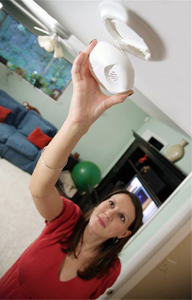 Many of us are thinking about Halloween today. But Daylight Saving Time also ends this weekend. While setting your clocks back, remember to replace your smoke alarm batteries and test to make sure they work properly.
Many of us are thinking about Halloween today. But Daylight Saving Time also ends this weekend. While setting your clocks back, remember to replace your smoke alarm batteries and test to make sure they work properly.
As we approach winter, we increase use of electrical appliances and the risk for home heating fires rise. In fact, half of all home heating fires happen in December, January and February. The death rate in homes with no working smoke alarms is twice as high as those with alarms, according to the National Fire Protection Association. Often, homes have smoke alarms but the batteries are missing disconnected or dead.
Make as many of these safety checks as you can this weekend:
Smoke alarms. Replace your smoke alarm batteries in every unit of your home and smoke alarms which are 10 years old. Also check if your smoke alarm model has been recalled. Kidde recalled 1.2 million smoke and carbon monoxide alarms in September. You can search for other recalls at www.cpsc.gov.
Carbon monoxide detectors. The state of Massachusetts began requiring carbon monoxide detectors in every residence in 2006 and many home owners have passed the 5-7 year lifespan of their models. Check if yours needs to be replaced. If you have a combination smoke alarm/carbon monoxide detector, check the unit’s specific instructions.
Washing machines and dryers. Clothes dryers are responsible for many home fires, but most can be prevented by regularly checking and cleaning the filters. Clean your models out now.
Cooking. Unattended cooking is the leading cause of cooking fires. Clear out any clutter in your kitchen now so you have plenty of room to set out your ingredients in advance. Find a cabinet or drawer to store anything you may need so you do not have to leave the room while cooking. Make sure you have a functioning fire extinguisher.
Home heating. Arrange for oil delivery or have your chimney or wood stove professionally cleaned. If you are using a space heater, take a few minutes to read our home heating safety tips. Each year, space heaters cause 80 percent of home heating fire deaths and one third of all home heating fires.
Get ready for the snow. Get your snow hat, gloves, shovel and road salt ready now and set them aside in the same place throughout the winter. When it snows, you want to be able to easily find them so you can clear your front steps and driveway so no one slips and falls in the snow and ice.
Cords. Walk through every room of your home and see what is plugged into the electrical outlets. Look under beds, behind computers, in power supplies and in your children’s rooms. Unplug cords you are not using and put them in a drawer until you need them. Pay extra attention to the USB cords for your tablets and cell phones and replace them if they look old or worn.
Get your car ready. Take a few precautions and reduce the stress of traveling in the snow. Collect and pack away ice scrapers and small shovels as well as an extra hat, pair of gloves and clothing in case you become stuck while traveling. Also pack a couple flashlights, a non-perishable snack, such as a granola bar, and make sure all your vehicle paperwork is easily accessible in the glove compartment.
Read More
Smoke Alarm Recall Affects More Than One Million
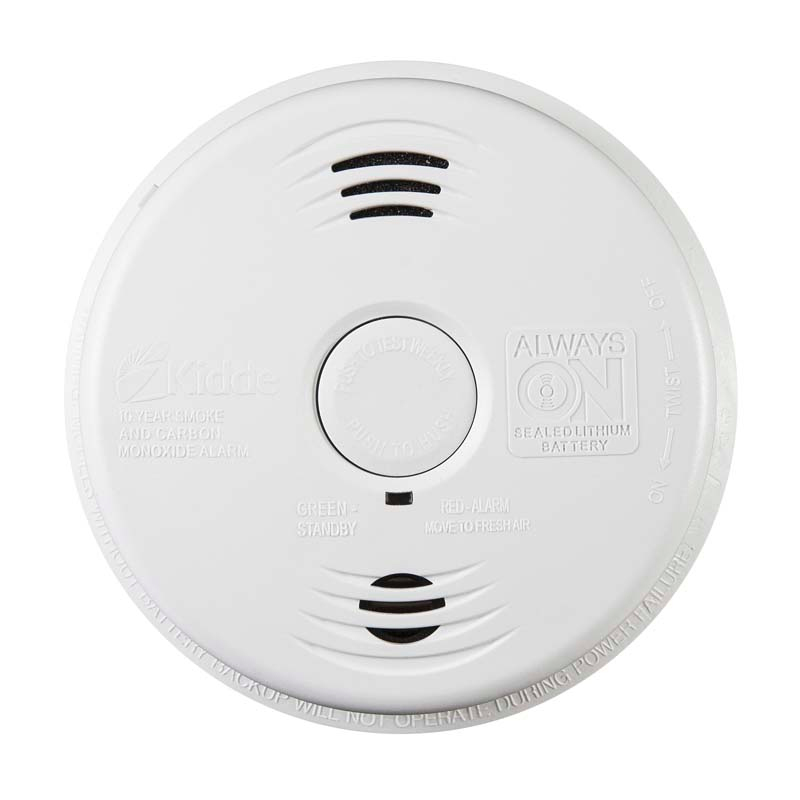 The Consumer Product Safety Commission is calling on the public to check their home smoke alarms, after more than a million units were recalled yesterday.
The Consumer Product Safety Commission is calling on the public to check their home smoke alarms, after more than a million units were recalled yesterday.
Kidde recalled 1.2 million smoke alarms in the United States and 112,000 in Canada. No injuries have been reported, but the models have a defect which may prevent them from working after a power outage. This is an important recall because each year, three to five deaths in property fires come in buildings without working smoke alarms, according to the U.S. Fire Administration.
The smoke alarms are all residential models:
- Kidde residential smoke alarm model i12010S with manufacture dates between December 18, 2013 and May 13, 2014
- Kidde Combination smoke/CO alarm il2010SCO with manufacture dates between December 30, 2013 and May 13, 2014
- Kidde Combination smoke/CO alarm model KN-COSM-IBA with manufacture date between October 22, 2013 and May 13, 2014
These smoke alarms are all hard-wired into a home’s electric system. The i12010S and il2010SCO models come with 10-year batteries inside while the KN-COSM-IBA uses replaceable AA backup batteries.
These smoke alarms look like most: white, round and are about 5 to 6 inches in diameter. Closely inspect the fine print on the front of yours for the word “Kidde.” On the backside, there is a label with the model number and manufacturing dates. “Always on” is also engraved on the front of alarms with sealed 10-year batteries.
These smoke alarms were sold at CED, City Electric Supply, HD Supply, Home Depot, Menards Inc. and other retailers. They were sold online at Amazon.com, HomeDepot.com and shopkidde.com from January 2014 through July 2014 for between $30 and $50.
Smoke Alarm Safety Tips
Daylight Saving Time. We will set our clocks back an hour for Daylight Saving Time on Sunday, November 2. The National Fire Protection Association and other safety officials recommend we also replace the batteries in our smoke alarms, test them to make sure they work and replace any models which are 10 years old.
Monthly Testing. Safety organizations also recommend we test smoke alarm batteries once a month.
Inform Others. Make sure everyone in your home knows what the smoke alarm sounds like and knows where they are located. Here is a resource for more safety and planning information.
Apartment Residents. If you rent an apartment, ask your building management company or property owner to show you the smoke alarms when you sign the lease. Contact them whenever you suspect a problem or have a question.
Read More
Use Space Heaters and Home Heating Equipment Safely
Home heating equipment is the second leading cause of home fires in Massachusetts. Because half of all home heating fires occur in December, January and February, now is the time to consider if you are heating your home safely.
The most important step is to make sure your smoke alarm has working batteries. Also, have your home heating equipment checked and serviced by a qualified professional each year. They can identify problems and clear any debris in your chimney or vents. Any obstruction increases the chance of fire and can lead to carbon monoxide poisoning, which can be fatal. Other ways to protect your family and home:
Space Heaters
Space heaters cause 33 percent of all home heating fires and 81 percent of home heating fire deaths, according to National Fire Protection Association (NFPA). If you have an older model, consider purchasing a new one with an automatic shut-off feature. Also, search for your model on the Internet to make sure it has not been recalled. The best resource is the Consumer Product Safety Commission website.
Use space heaters on even surfaces and always keep them three feet away from combustibles, such as bed spreads and clothing. Also keep children and pets at least this far away.
Do not use an extension cord and use space heaters on a flat surface where they will not tip over. Remember to turn it off before you go to sleep or if you leave the room.
No Overloaded Electrical Outlets
Be careful not to overload electrical outlets. Space heaters draw a large amount of electricity. Shift around appliances if you think you may be overloading an outlet.
Keep Vents Clear
Monitor your indoor and outdoor heating vents throughout the winter. When it snows, clear your outside heating vents even before you shovel your driveway.
Wood, Coal and Pellet Stoves
In Massachusetts, you need a building permit to install wood, pellet or coal burning stoves and fireplaces. They must be inspected by a local building inspector prior to use.
Last year, there were over 800 fire incidents in Massachusetts involving chimneys, fireplaces and woodstoves. Many result from a build-up of creosote, a by-product of burning wood.
Read the manufacturer’s instructions on how to use your heating equipment. Do not use flammable liquids to start a fire. For fireplaces, check that the damper is open before starting a fire so there is not a build-up of smoke and carbon monoxide.
Use the fireplace screen to prevent flames and sparks from moving outside the fireplace and causing burns and injuries. Do not close the damper until the fire is fully out.
When finished, dispose of ashes in a metal ash can and keep it outside your home and garage. Also keep it away from porches and decks.
Cooking
Make sure you have proper ventilation before you start cooking. Do not use grills inside your home.
Related:
Heating fire safety: Wood Stoves, Space Heaters and Fireplaces, U.S. Fire Administration.
Read More
Remember to Change Your Smoke Alarm Batteries
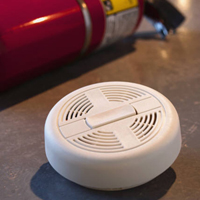 As Daylight Saving Time ends Sunday, we all have a very important chore: changing the batteries in our smoke alarms and carbon monoxide (CO) detectors. The good news is we have an extra hour in the day to get that chore done.
As Daylight Saving Time ends Sunday, we all have a very important chore: changing the batteries in our smoke alarms and carbon monoxide (CO) detectors. The good news is we have an extra hour in the day to get that chore done.
Smoke alarms provide necessary warning for us to act in a fire. Each year, more than 2,200 people die in unintentional home fires in the United States. The greater tragedy is nearly two-thirds of these deaths occur in homes with no smoke alarms or ones which do not work.
Here are a few additional suggestions for Boston and Massachusetts residents:
- You should have working smoke alarms on every level of your home, inside and outside sleeping areas.
- Purchase fire extinguishers for your kitchen, basement, work areas, and garage. Check them every few months to remind yourself of where they are, and make sure they are properly charged.
- Replace smoke alarms every 10 years and carbon monoxide detectors every five years.
- Talk to your family, roommates and landlord about your fire evacuation plan.
- Walk through your home and apartment and practice your fire evacuation plan. In an emergency, you and others may have to pass through unfamiliar areas.
- If you are a Boston college student renting an apartment, make sure you and your roommates are following house rules for cooking and that no one is smoking in the living area.
- Report any potential fire hazards to landlords promptly, including blocked access ways and electrical irregularities.
Housing Code Violations and Over-Crowding in Boston Student Housing
The fire on April 26, 2013 at 87 Linden Street in Allston, the second serious fire in less than two years on the same block, is a tragic reminder of what can happen with overcrowded, substandard student housing.
The Fire Marshall will now investigate the cause of the Allston fire. In addition, The Boston Inspectional Services Division should examine whether the unit was overcrowded in violation of the Boston Zoning Ordinance, and whether housing codes and accessibility codes were violated. Enforcement of city ordinances is, unfortunately, inconsistent, and usually after the fact. Knowing this, landlords and realty companies frequently violate these ordinances in the name of profits. The victims are often unsuspecting college students. As a result, students, who pay high rents, are subjected to increased risks from their overcrowded housing.
The law in Massachusetts governs how homes must be safely maintained in order to prevent personal injury to occupants of the property. In Boston, zoning ordinances require building owners to declare whether their properties are single-family or multi-family units. In either case, under Boston’s zoning ordinances, under the definition of “family,” no unit may be occupied by more than four unrelated students unless the building meets much stricter building requirements.
It is also generally illegal for a landlord to create bedrooms in basements, and it may be against code to create a bedroom in an attic. No matter how it is configured, every house or apartment must have working smoke detectors throughout the unit.
Once a unit exceeds the four unrelated-occupant threshold, it technically becomes a rooming house, which makes it subject to very strict fire-prevention regulations under M.G.L. c. 148, Sec. 26I and other regulations. For example, a rooming house must have walls and ceilings made from fire-rated materials to slow flames in the event of a fire. Smoke detectors must be in every bedroom,
and must be interconnected. Even more important, every boarding house must have a working sprinkler system. Boarding houses must also meet accessibility guideline and provide multiple means of egress for upper floors, which may include fire escapes.
Real estate brokers and leasing agents share responsibility for student overcrowding and exposure to risk from substandard housing. A quick look at any leasing agent’s website will reveal scores of units available for student occupancy which are intended to house more than four unrelated individuals. Leasing agents collect a single month’s rent, sometimes more, for their services. Since they also take the responsibility to collect signatures on leases, they know exactly how many students will be in the unit. Leasing agents simply cannot claim ignorance of the laws regarding overcrowding.
Who May Be Liable
It is our firm’s opinion that violations of the boarding house rules are evidence of negligence and may create liability for the responsible landlord.
We also believe that knowing and willful violations of the boarding house rules by real estate companies or leasing agents may subject them to liability as well. Violations of these standards may also be violations of the Massachusetts Consumer Protection Act, which may subject landlords and their leasing agents to multiple damages and attorneys’ fees.
Other Cases
Injuries and death from substandard housing may also lead to criminal charges against landlords. For example, in January 2012, two absentee landlords were convicted of manslaughter after a fire in an illegal apartment in Quincy led to the deaths of three tenants. The landlords were accused of wantonly violating building and fire codes.
The question of the enforceability of rooming house regulations is also pending at the Massachusetts Supreme Judicial Court. In that case, civil claims were brought against a Worcester landlord for violation of the Worcester zoning bylaw. In that city, no more than four unrelated persons can occupy a home. The city brought the violation because there were more than four students in the unit. The decision in that case is expected to be handed down in the next few weeks.
Update: The City of Boston later cited the owner of the two-family structure, Anna Belokurova, for running an illegal rooming house and not obtaining the permits needed to create bedrooms in the basement, according to The Boston Globe. Read more.
Related Articles:
Woman killed, firefighters and occupants injured in raging Allston fire, Boston Herald.
One dead, 15 injured in Allston house fire, The Boston Globe.
Jury finds landlords guilty of involuntary manslaughter in Quincy apartment fire, The Patriot Ledger.
About Breakstone, White & Gluck
Breakstone, White & Gluck of Boston has over 85 years combined experience represented injured clients in Massachusetts. If you or a loved one has been injured, learn your rights. For a free legal consultation, contact us at 800-379-1244 or 617-723-7676 or use our contact form.
Preventing Cooking Accidents This Thanksgiving
 Thanksgiving dinner is the largest meal of the year for many families, the one that takes the most planning and time to prepare. As you work in the kitchen, remember Thanksgiving is also the nation’s leading day for kitchen fires and when burns and cooking injuries are more likely to occur. The good news is you can prevent most of these accidents and focus on enjoying the day by following a few simple steps below. We have also included safety precautions for deep frying a turkey.
Thanksgiving dinner is the largest meal of the year for many families, the one that takes the most planning and time to prepare. As you work in the kitchen, remember Thanksgiving is also the nation’s leading day for kitchen fires and when burns and cooking injuries are more likely to occur. The good news is you can prevent most of these accidents and focus on enjoying the day by following a few simple steps below. We have also included safety precautions for deep frying a turkey.
Make sure your smoke detector is working. Test it in advance and do not disable it.
Use a cooking timer. This will help you keep track of when to check the turkey and when other food dishes are finished.
Stay home while cooking. Stay home and check the turkey frequently.
Cooking stovetop. Stay in the kitchen when you are cooking stovetop. If you must leave, turn the stove off.
Keep children away. Keep children at least three feet away from the stove at all times.
Hot food and liquids. Make sure children also stay away from hot food and liquids, which can cause burn injuries. This includes coffee, gravy and the steam and sauce on vegetables – especially when they first come out of the oven or off the stove.
Neat kitchen. Keep clutter to a minimum near the stove. Set aside oven mitts, towels and other utensils. Do not leave sharp knives or utensils out where young children can reach them. Ask guests to put their belongings in another area.
Keep matches, lighters and candles away. Lock matches and utility lighters in cabinets away from children. Also do not use candles if you have young children in the home.
Use a commercial cooking bag. Do not cook your turkey in a brown paper bag from the grocery store. They are unsanitary and may start a fire.
Tips if you are deep frying your turkey:
Read the instructions. Read the manufacturer’s instructions for the turkey fryer before each use.
Understand your propane gas burner. Ask your propane gas provider about safe practices to prevent fires and explosions.
Wear safety gear. Wear safety glasses, gloves which stretch to your elbows, a long-sleeved shirt and an apron.
Deep fry your turkey outside. Set up your fryer in an open area, away from your house, garage, decks and other structures.
Select a smaller turkey. Use a turkey that is 12 pounds or less in size.
Do not stuff the turkey. Stuffing the turkey could interfere with even cooking.
Do not use too much oil. Determine the right amount of oil in advance by placing the turkey in the fryer. Fill with water to the top. Remove the turkey and measure the amount of water remaining. Use the same amount of oil. Your fryer may also have a measurement line inside.
Fully thaw the turkey. Burn injuries can occur when any water on the turkey comes in contact with the oil, then boils over or splatters while being cooked. Fully thaw the turkey and dry it off with paper towels before deep frying.
Turn off the fryer before adding the turkey. Warm up the fryer before cooking, then turn it off just before putting the turkey inside. Start cooking again after it is firmly in place.
Related:
Thanksgiving Safety, National Fire Protection Association.
Cooking Safety, National Fire Protection Association.
Read More


